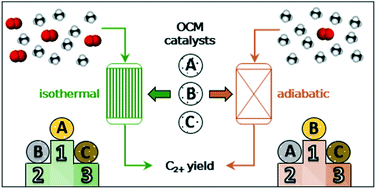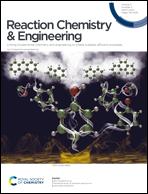Catalyst screening for the oxidative coupling of methane: from isothermal to adiabatic operation via microkinetic simulations†
Abstract
A microkinetics-based study was performed on the relevance of conventional isothermal data for the selection of catalysts for oxidative coupling of methane (OCM) in adiabatic reactors. Catalyst performances from isothermal tests in oxygen-lean feeds (CH4/O2 ≥ 7) were found to reliably indicate the catalyst ranking for adiabatic operation, which features large methane excess for temperature control reasons. In such conditions, the concentration of surface oxygen was found to be significantly lower on the top-performing catalysts. This was attributed to the lower contribution of surface reactions, which is beneficial for C2+ selectivity at iso-conversion. However, these relevant isothermal data are scarce in literature because typically oxygen-rich (CH4/O2 < 5) reaction conditions are used to maximize the C2+ yield. Therefore the majority of lab-scale tests at isothermal conditions might have resulted in the rejection of catalysts that could perform reasonably well in adiabatic reactors. The insights gained via kinetic and statistical analysis were further elaborated to suggest experimental guidelines for future isothermal benchmarking of OCM catalysts in view of the industrially-relevant adiabatic operation.



 Please wait while we load your content...
Please wait while we load your content...